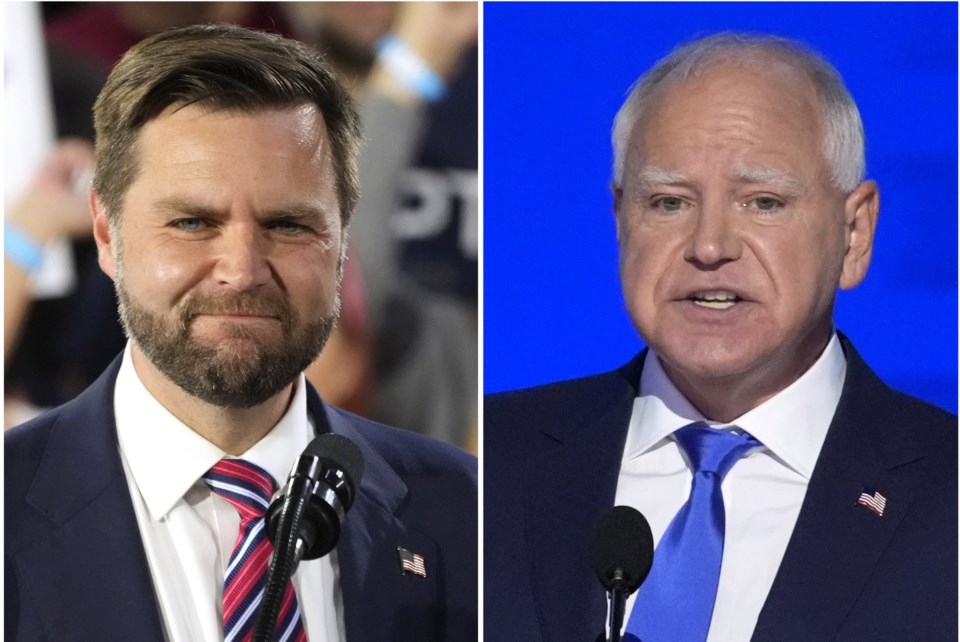SAINT PAUL — Tim Walz and JD Vance played attack dog for their presidential partner in a policy-focused debate about the economy, inflation and rising tensions in the Middle East.
The only vice-presidential matchup ahead of the razor-thin race to the White House saw a less wrought exchange at a time of increasing polarization in American politics.
Both Walz, the 60-year-old Democratic governor of Minnesota, and Vance, the 40-year-old Republican senator from Ohio, acknowledged moments of agreement, shared humanity and the need for bipartisan cooperation while sharply criticizing the top of each other’s ticket, as is expected in a vice-president debate.
"Vance is brilliant and I’m expecting good things from him," said Alec Beck, chairman of the fifth congressional district for the Republican Party of Minnesota, at a watch party in a theatre in New Hope.
"And our governor is very good on his feet, even though he’s not on our team, I give the devil his due. He has a lot of skills in this area."
Republicans and Democrats were both hoping Tuesday's matchup would demonstrate their vice-presidential candidate's ability to connect with voters in battleground states that will play a critical role in deciding the U.S. election in November.
"They will both be trying to connect with those key Midwestern voters, that's part of why each one of them was chosen," said Matthew Lebo, a specialist in U.S. politics at Western University in London, Ont.
"Thinking about especially male voters in those key Midwestern swing states: Pennsylvania, Wisconsin and Michigan."
Those states swung Republican when Trump won the 2016 election, and in 2020 they helped put President Joe Biden in the White House.
Vance opened the debate by talking about his life and struggles growing up. Before entering the political sphere, the Republican vice-presidential hopeful rose to fame with the 2016 publication of his memoir, "Hillbilly Elegy."
Walz spoke about being a coach, a teacher and a father.
Both Midwestern candidates took a friendlier tone than was seen in the previous presidential debates during the tumultuous campaign season, which saw Joe Biden drop out of the race after a disastrous performance in the first matchup against Trump.
Political experts have said Harris dominated the presidential debate last month by prodding Trump into tirades that strayed far from his intended goals of focusing on immigration and the economy.
Walz took a different approach, noticeably refraining from calling Vance "weird" despite gaining national prominence by giving his Republican rivals the label. Instead he focused on Trump's record and fear-based campaigning, contrasting it to Harris' talk of hope for a better future.
Vance also approached the debate differently than his running mate, softening the more forceful tone he’s become known for during numerous television appearances since he joined the Republican ticket.
Both threw barbs over plans for housing, healthcare and migrants. Little information was gleaned about foreign policy plans or trade, despite comments about keeping American jobs at home.
There was a stark disagreement near the end of the debate when Vance would not answer Walz's direct question on whether Trump lost the 2020 election.
Walz said the election denial had to stop because "it’s tearing our country apart" and told viewers they have a choice about "who is going to honour democracy and who is going to honour Donald Trump."
At a watch party organized by Education Minnesota, the union representing teachers and support professionals, that answer shored up exasperated reactions among educators.
"JD Vance disqualified himself in the last question of the debate by refusing, to date, to say that Joe Biden won, and Donald Trump lost the last election," said Randi Weingarten, president of the American Federation of Teachers.
"By refusing, as a former military guy, to condemn an insurrection, by attempting as he did, with virtually every question, to create stories and rewrite history. Tim Walz showed his basic goodness and caring."
People wore blue shirts in support of Vice-President Kamala Harris and Walz, cheering loudly as the governor, who is a former teacher, brought up Minnesota policies repeatedly throughout the debate.
Both Democrats and Republicans claimed their candidate took the win. Harris-Walz Campaign Chair Jen O’Malley Dillon said Walz showed exactly why Harris picked him.
“In the debate, Americans got to see a real contrast: a straight talker focused on sharing real solutions, and a slick politician who spent the whole night defending Donald Trump’s division and failures,” Dillon said in a statement.
Trump’s campaign meanwhile said Vance “unequivocally won tonight's debate in dominating fashion.”
“It was the best debate performance from any Vice-Presidential candidate in history,” said the joint statement from campaign managers Chris LaCivita and Susie Wiles.
This report by The Canadian Press was first published Oct. 1, 2024.
— With files from The Associated Press
Kelly Geraldine Malone, The Canadian Press



